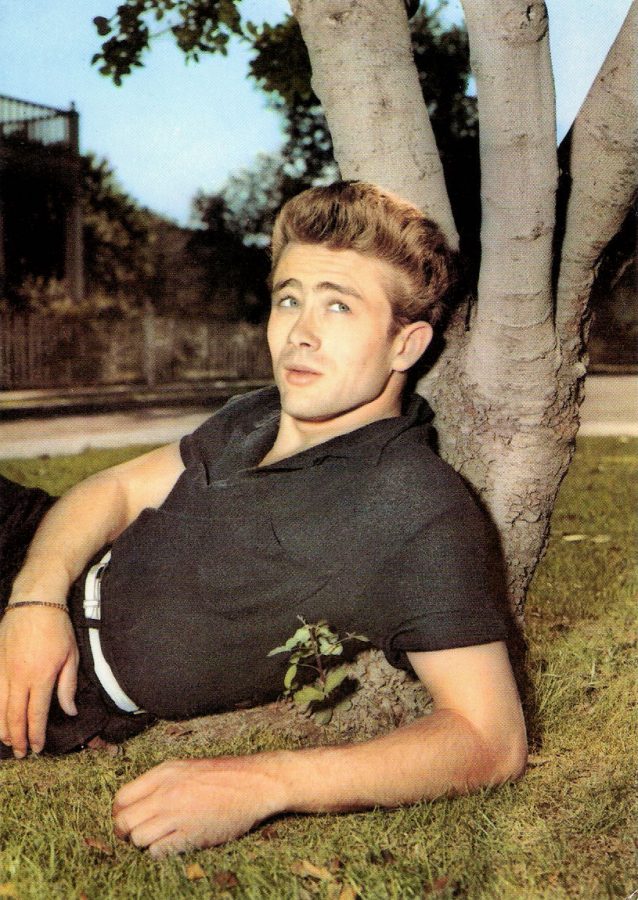Actors debate over James Dean posthumously cast using CGI
Truus, Bob & Jan Too! | FlickrJames Dean has been nominated posthumously for two Academy Awards for Rebel Without a Cause and Giant.
November 18, 2019
When 1950s heartthrob James Dean said, “if a man can bridge the gap between life and death, if he can live on after he’s dead, then maybe he was a great man,” he didn’t know he had accurately predicted his own fate.
Dean has been cast to play the second leading man for the upcoming Vietnam War film Finding Jack. Through the power of CGI, he will be appearing on the silver screen for the first time since his death 64 years ago.
The production company, Magic City Films, approached Dean’s family in regards to casting him posthumously.
They granted the company the rights to use Dean’s movements from other films with a live actor standing in for his voice.
When CNN asked Anton Ernst, co-director of the film, why the family signed off the right to his image, he said they felt it would be “a movie he never got to make.”
Having died young at the age of 24 in a car accident, Dean was only ever able to star in three films, East of Eden, Rebel Without a Cause and Giant.
With CGI, or computer-generated imagery, being increasingly used in films, it has rapidly become a norm, rather than a surprise, on the screen.
Much of Walt Disney Pictures’ latest productions, for instance, incorporate a vast amount of CGI technology to realize fantasy characters in live action adaptations like The Lion King and Beauty and the Beast.
CGI, however, has also reached a new controversial extreme, recreating stars who have long passed away. From Paul Walker in the Fast and the Furious series to Audrey Hepburn in a chocolate commercial to Marilyn Monroe and Grace Kelly in Dior advertisements, deceased actors and actresses are reprising their roles as the best of Hollywood.
Some celebrities have expressed vehement disapproval towards this newfound cinematic Lazarus phenomenon.
Chris Evans, an actor most known for his portrayal as Marvel character Captain America, tweeted, “I’m sure he’d be thrilled. This is awful. Maybe we can get a computer to paint us a new Picasso. Or write a couple new John Lennon tunes. The complete lack of understanding here is shameful.”
Late comedian and actor Robin Williams’ daughter, Zelda
Williams agreed with Evans’ statement.
She tweeted, “I have talked to friends about this for YEARS and no one ever believed me that the industry would stoop this low once tech got better. Publicity stunt or not, this is puppeteering the dead for their ‘clout’ alone and it sets such an awful precedent for the future of performance.”
Williams’ tweet is widely supported by critics of the film. She alludes to three major concerns that CGI brings.
First, that actors can be forced to say dialogue that they personally may not have agreed to say if alive.
Second, that “resurrecting” these actors and actresses can tarnish their golden reputations or known acting skills.
Lastly, that these CGI puppets make the need for new actors obsolete, as companies will profit more by using deceased and successful stars.
She echoes the words of her father, who too believed that CGI would be detrimental to film. The Guardian reports that he even went as far as to create a legal deed that prohibits his image to be used in any film or publicity until 2039.
Ernst does not understand the public outcry.
He told the Hollywood Reporter that he was “saddened” and “confused” and added that, “we never intended for this to be a marketing gimmick.”
Though the director did not intend to disrespect James Dean and his legacy, the film’s public denouncement and hate comments show that some still think he has crossed the line.
Regardless, the film is still set to enter production and audiences must now wait until Nov. 11, 2020 to see if Dean is the same “Rebel Without a Cause” as he was in the 1950s.








